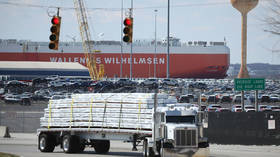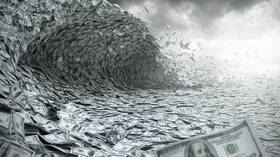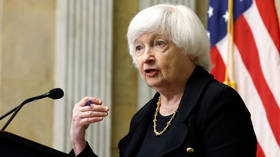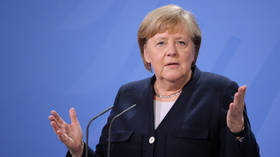Imposing tariffs on friends and foes alike, Trump is killing both the US economy and his own chance of victory

“There you go again,” as former president Ronald Reagan used to say. Donald Trump has escalated his tariffs war, this time against Canada, and it’s likely to go just as poorly as his fight against China.
The latest such attack on America’s northern neighbor centers on aluminum, coming about 60 days after the two countries had renegotiated the North American Free Trade Agreement, now referred to as the US-Mexico-Canada Agreement. It’s a 10 percent levy on all such imports – a move to be met with a retaliatory tax on American aluminum products. US citizens could now be paying higher prices on everything from sodas to cars, and on anything else that contains aluminum.
Trade wars don’t work. For that matter, neither do sanctions. For every action, there’s an equal and opposite reaction. In the case of tariffs, the businesses will often pass those costs on to consumers. As for sanctions, they typically hurt the ‘little guy’ who’s powerless to effect any meaningful change from his government. The best way to bring foreign leaders closer to your point of view is to engage with them.
“Trade is a win-win,” said Ray Keating, chief economist with the Small Business & Entrepreneurship Council, in an interview with this writer. “The better way would be to start positive and constructive free trade agreements. When you look at aluminum and steel, these are capital goods and inputs to all US businesses. Overall, 55 percent of our imports include steel and aluminum.”
Economists around the globe almost universally promote free and fair trade because such policies create jobs and healthier economies – a principle that applies across the board and to both Canada and to China, which is the second-biggest economy in the world. And if China develops, it can buy more American goods and services, which include those modern technologies that can help it clean up its environment. As John F Kennedy used to say, “a rising tide lifts all boats.”
Elbowing China out of the global marketplace, however, hurts everyone. Whereas President Obama had wanted to enforce fair trade practices by implementing the multilateral trade agreement called the Trans-Pacific Partnership, Trump went right for the jugular: he’s penalized China with about $550 billion in tariffs, which have been met with $185 billion in tariffs on American products in return.
The joke is on Americans
In other words, the “America First” policy is hurting Americans – just as US sanctions on other countries have hurt ordinary citizens. The Federal Reserve Bank of New York has discovered that the trade war with China has damaged US investment in its economy by 0.3 percent – a number that’s expected to grow to 1.6 percent by year end. The impact: a $1.7 trillion loss in market capitalization that has killed jobs and profits.
“The trade war has already done meaningful economic damage to the US and global economies. Since it began in earnest …, the trade war with China has cost an estimated 0.3 percentage point in US real GDP and almost 300,000 jobs,” says Moody’s Analytics.
Also on rt.com Hong Kong’s exports to US will be labeled as goods from ChinaBloomberg Economics adds that the trade war with China will end up costing the US economy $316 billion.
Nearly a third of the US economy is tied to trade, says Keating, noting that five percent is linked to China. Consider American farmers: before the trade war, China bought 61 percent of US soybean exports – about a third of all US production. That market has now evaporated, says the American Soybean Association, and it may not return once China inks new deals with other suppliers.
American isolationism has also opened the door to Chinese economic expansion. Through its Belt and Road Initiative, China is creating a vast network of railways, pipelines and highways across four continents and 76 countries. If fruitful, it will position itself to market its products around the globe. While Trump is focused on “Making America Great Again,” China is exploiting the global void.
The “America First” policy has fallen short politically, as well. China has quit taking Trump seriously. In his book, John Bolton wrote that Trump had asked Chinese President Xi Jinping to buy more soybeans from the US to assist him with his presidential race. Trump also allegedly blessed the leadership’s efforts to round up the Uyghur Muslims – a move eerily similar to how he ordered unmarked federal forces to beat and pepper-spray peaceful US protesters.
What now? China and Canada are the US’ top trading partners. American multinationals ranging from Tesla to Starbuck are clamoring to get inside China to sell to its 400 million middle-class consumers. It doesn’t just create a “wealth effect” – it creates goodwill, and the kind that means peace.
“A lot of people view imports as a negative,” says Keating. “But that’s not the case and it doesn’t line up with Economics 101: each business focuses on what it does best and it then trades with others, whether across town or across borders. Value is created and we see the benefits of enhanced growth, better resource allocation and more consumer choice. The bottom line: your allies must be able to count on you. You benefit most from free-trade policies and in keeping everyone engaged.”
If economists everywhere can agree that dialogue supersedes digression, then why has the US come to rely on tariffs? Trump refers affectionately to himself as “Tariff Man” and as far back as the 1980s, was critical of Reagan’s free trade policies. He believes in tariffs. But history has proven they don’t work, beginning with the Great Depression and concluding with the Chinese trade war. It’s unlikely Trump will change his long-held positions. It’s more likely American voters will tire of the economic distress and change their leader.
Like this story? Share it with a friend!
The statements, views and opinions expressed in this column are solely those of the author and do not necessarily represent those of RT.













